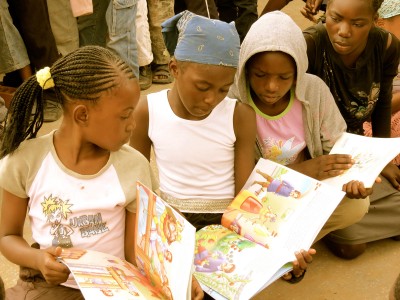 Carly Buehler isn’t daunted by the idea of working with limited resources under challenging situations. The Neag alumna has been a volunteer teacher at a community school for orphans and other vulnerable, at-risk children in Lusaka, Zambia, since graduating from the Neag School’s Integrated Bachelor’s/Master’s Teacher Education program in 2012. And there, she is using her education and expertise to make a real difference.
Carly Buehler isn’t daunted by the idea of working with limited resources under challenging situations. The Neag alumna has been a volunteer teacher at a community school for orphans and other vulnerable, at-risk children in Lusaka, Zambia, since graduating from the Neag School’s Integrated Bachelor’s/Master’s Teacher Education program in 2012. And there, she is using her education and expertise to make a real difference.
Named Chikumbuso, meaning “remembrance,” the school is a grassroots project designed to provide children with a free education, as well as to provide widows with the job skills they need to support themselves and their families.
“I fell in love with Chikumbuso when I visited there for two weeks during my senior year in high school, working on a project called ‘The Stigma of AIDS.’ I told myself I would go back again,” said Buehler, who was introduced to the school by Connecticut family friend and founder Linda Wilkinson.
The opportunity to go back to Chikumbuso came in 2009, when she spent three months as an intern there, helping classroom teachers and working with single mothers and widows. It was then she began considering how to use opportunities for independent study and her Neag education to be even more useful in Zambia.
“The most powerful thing I took away from Chikumbuso was how eager the children were to learn,” Buehler said. “As a young student, I had always taken my education for granted. But in Zambia, most children don’t have the opportunity to go to school. Throughout my studies at UConn, I always appreciated what I was learning and was always thinking about how I could use my education to improve the work being done at Chikumbuso.”
![Melibrarians[1]](https://media.education.uconn.edu/aurora/neag/2014/05/Melibrarians1-299x400.jpg) Now living in Zambia and working at Chikumbuso as a full-time volunteer, Buehler’s responsibilities include lesson planning and assessment, improving the math curriculum, teaching math classes, and holding training workshops for local teachers who don’t have access to government support.
Now living in Zambia and working at Chikumbuso as a full-time volunteer, Buehler’s responsibilities include lesson planning and assessment, improving the math curriculum, teaching math classes, and holding training workshops for local teachers who don’t have access to government support.
“Carly’s commitment and enthusiasm for her work is inspirational,” said Mary Truxaw, Neag School associate mathematics professor and Buehler’s independent study advisor. “I’m proud that she has developed a strong stance as a lifelong learner, where she continues to push herself to learn more so that she can support the learning of others.”
Buehler visited UConn last December with Getrude Banda, who earned her teaching certification by working at Chikumbuso and later became the school’s principal. “It was such a rewarding experience to share my unique story with the current Neag students,” Buehler said. “There are so many unique teaching experiences around the world, and I was pleased that I could share my experience with those at UConn who may have not considered ‘untraditional’ teaching opportunities.”
Buehler’s “untraditional” teaching experience includes getting used to working in a place where it’s hard to find a printer or copy machine, power outages occur at least once a week, and bad internet connections are common.
“I’ve learned how difficult it is to create an engaging and fun lesson with very limited supplies,” Buehler said. “It is difficult, but not impossible.”
Another challenge for Buehler has been the community’s unfamiliarity with books. Reading has not always been an important part of the lives of those who attend, and live near Chikumbuso—something Buehler is working to change. Toward this end, she created a school wide reading competition and encouraged teachers to use library books in their classrooms and read aloud to students. The school only received its first books three years ago.
![Teacher Workshop[1]](https://media.education.uconn.edu/aurora/neag/2014/05/Teacher-Workshop1-400x300.jpg) “Carly has clearly been touched by the Chikumbuso project,” said Thomas Levine, Neag School assistant professor in Curriculum & Instruction, who helped arrange her recent Neag visit. “She has gained invaluable experience working on curriculum, professional development for teachers, and in teaching, despite the challenges she has faced.”
“Carly has clearly been touched by the Chikumbuso project,” said Thomas Levine, Neag School assistant professor in Curriculum & Instruction, who helped arrange her recent Neag visit. “She has gained invaluable experience working on curriculum, professional development for teachers, and in teaching, despite the challenges she has faced.”
“After teaching in Zambia, I feel I could walk into any school district and make the best of what supplies are available to me,” said Buehler, who plans to one day teach in the United States and provide her students with a focus on global awareness. “I’ve gained a lot of strength and confidence and know, first-hand, how important it is for children to be exposed to different cultures, traditions and family structures. It can change a student’s outlook on life, just like it did to me.”
 Facebook
Facebook
 Twitter
Twitter
 LinkedIn
LinkedIn
